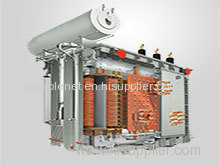
Special Transformers for Industrial Applications
| Min. Order: | 1 Piece/Pieces |
|---|---|
| Trade Term: | FOB,CIF |
| Payment Terms: | Paypal, L/C, D/P, D/A, T/T, WU, Money Gram |
| Supply Ability: | 100pieces |
| Place of Origin: | Henan |
Company Profile
| Location: | Zhengzhou, Henan, China (Mainland) |
|---|---|
| Business Type: | Manufacturer, Trading Company, Distributor/Wholesaler |
Product Detail
| Means of Transport: | Ocean, Air, Land |
|---|---|
| Coil:Core-type Transformer: | Winding Type:Two-winding Transformer |
| Production Capacity: | 100pieces |
| Delivery Date: | 5~15 offical days |
Product Description
A number of industry applications require specific industrial transformers due to the usage of power (current) as a major resource for production. Electric arc furnaces (EAF), ladle furnaces (LF) and high-current rectifiers need a specific design to supply the necessary power at a low voltage level. These transformer types, as well as transformers with direct connection to a rectifier are called special-purpose or industrial transformers, whose design is tailor-made for high-current solutions for industry applications.
4-1 Electric arc furnace transformers
EAF and LF transformers are required for many different furnace processes and applications. They are built for steel furnaces, ladle furnaces and ferroalloy furnaces, and are similar to short or submerged arc furnace transformers (fig. 5.6-1). EAF transformers operate under very severe conditions with regard to frequent overcurrents and overvoltages generated by short-circuit in the furnace and the operation of the HV circuitbreaker. The loading is cyclic. For long-arc steel furnace operation, additional series reactance is normally required to stabilize the arc and optimize the operation of the furnace application process.
Specific items
EAF transformers are rigidly designed to withstand repeated short-circuit conditions and high thermal stress, and to be protected against operational overvoltages resulting from the arc processes. The EAF reactors are built as 3-phase type with an iron core, with or without magnetic return circuits.
Design options
Direct or indirect regulation
On-load or no-load tap changer (OLTC/NLTC)
Built-in reactor for long arc stability
Secondary bushing arrangements and designs
Air or water-cooled
Internal secondary phase closure (internal delta)
4-2 DC electric arc furnace transformers
Direct-current electric arc furnace (DC EAF) transformers are required for many different furnace processes and applications. They are built for steel furnaces with a Thyristor rectifier. DC EAF transformers operate under very severe conditions, like rectifier transformers in general but using rectifier transformers for furnace operation. The loading is cyclic.
4-3 Rectifier transformers
Rectifier transformers are combined with a diode or Thyristor rectifier. The applications range from very large aluminum electrolysis to various medium-size operations. The transformers may have a built-in or a separate voltage regulation unit. Due to a large variety of applications, they can have various designs up to a combination of voltage regulation, rectifier transformers in double-stack configuration, phase-shifting, interphase reactors, transductors and filter-winding.
Specific items
Thyristor rectifiers require voltage regulation with a no-load tap changer, if any. A diode rectifier will, in comparison, have a longer range and a higher number of small voltage steps than an on-load tap changer. Additionally, an auto-connected regulating transformer can be built in the same tank (depending on transport and site limitations).
Design options
Thyristor or diode rectifier
On-load or no-load tap changer (OLTC/NLTC)/filter winding
Numerous different vector groups and phase shifts possible
Interphase reactor, transductors
Secondary bushing arrangements and designs
Air or water-cooled
4-4 Converter transformers
Converter transformers are used for large drive application, static voltage compensation (SVC) and static frequency change (SFC).
Specific items
Converter transformers are mostly built as double-tier, with two secondary windings, allowing a 12-pulse rectifier operation.
Such transformers normally have an additional winding as a filter to take out harmonics. Different vector groups and phase shifts are possible.
Bringing the energy safely to the consumer: A basic requirement applicable to all Power Transformers. However, every single one is unique designed according to individual factors such as voltage, power, climate, system topography, sound level and many more. Tinde Power is your partner, who picks up these requirements converting them into convincing solutions with maximum quality. Power Transformers that render their service reliably at site.


